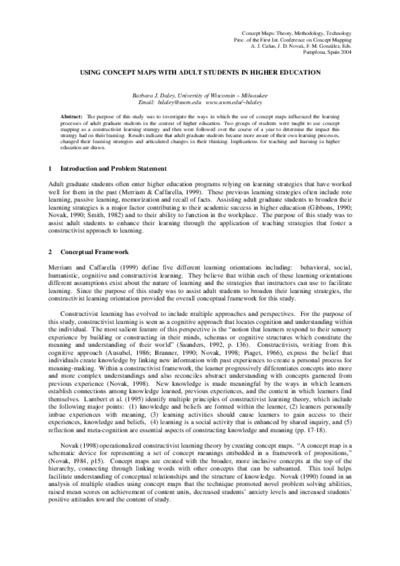Using Concept Maps with Adult Students in Higher EducationBarbara J. Daley
|
 |
 Diese Seite wurde seit 19 Jahren inhaltlich nicht mehr aktualisiert.
Unter Umständen ist sie nicht mehr aktuell.
Diese Seite wurde seit 19 Jahren inhaltlich nicht mehr aktualisiert.
Unter Umständen ist sie nicht mehr aktuell.
 Zusammenfassungen
Zusammenfassungen
The purpose of this study was to investigate the ways in which the use of concept maps influenced the learning processes of adult graduate students in the context of higher education. Two groups of students were taught to use concept mapping as a constructivist learning strategy and then were followed over the course of a year to determine the impact this strategy had on their learning. Results indicate that adult graduate students became more aware of their own learning processes, changed their learning strategies and articulated changes in their thinking. Implications for teaching and learning in higher education are drawn.
Von Barbara J. Daley im Konferenz-Band Concept Maps: Theory, methodology, technology (2005) im Text Using Concept Maps with Adult Students in Higher Education  Dieses Konferenz-Paper erwähnt ...
Dieses Konferenz-Paper erwähnt ...
 Personen KB IB clear | D.P. Ausubel , Jerome S. Bruner , D. B. Gowin , Joseph D. Novak , Jean Piaget | |||||||||||||||||||||||||||||||||||||||||||||
 Aussagen KB IB clear | Concept Maps fördern das Lernen zu Lernen | |||||||||||||||||||||||||||||||||||||||||||||
 Begriffe KB IB clear | Concept MapConcept Map
, Konstruktivismusconstructivism
,  Lernen Lernen learning learning
| |||||||||||||||||||||||||||||||||||||||||||||
 Bücher |
|
 Dieses Konferenz-Paper erwähnt vermutlich nicht ...
Dieses Konferenz-Paper erwähnt vermutlich nicht ... 
 Nicht erwähnte Begriffe | Concept Mapping Software |
 Zitationsgraph
Zitationsgraph
 Zitationsgraph (Beta-Test mit vis.js)
Zitationsgraph (Beta-Test mit vis.js)
 Volltext dieses Dokuments
Volltext dieses Dokuments
 |  Using Concept Maps with Adult Students in Higher Education: Artikel als Volltext ( Using Concept Maps with Adult Students in Higher Education: Artikel als Volltext ( : :  , 51 kByte; , 51 kByte;  : :  2021-03-21) 2021-03-21) |
 Anderswo suchen
Anderswo suchen 
 Beat und dieses Konferenz-Paper
Beat und dieses Konferenz-Paper
Beat war Co-Leiter des ICT-Kompetenzzentrums TOP während er Dieses Konferenz-Paper ins Biblionetz aufgenommen hat. Er hat Dieses Konferenz-Paper einmalig erfasst und bisher nicht mehr bearbeitet. Beat besitzt kein physisches, aber ein digitales Exemplar. Eine digitale Version ist auf dem Internet verfügbar (s.o.). Es gibt bisher nur wenige Objekte im Biblionetz, die dieses Werk zitieren.










 Biblionetz-History
Biblionetz-History